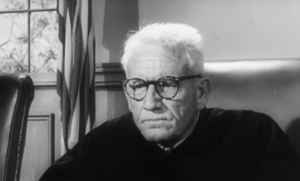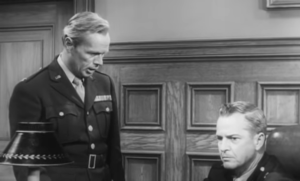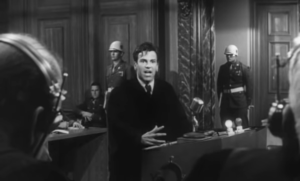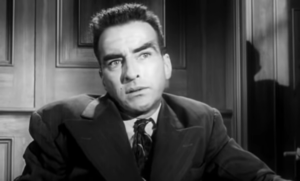Rating: 4.5 out of 5




![]()
I just finished Judgment at Nuremberg. The film is based on the fictionalized version of The Judges’ Trial. It was the third of the 12 trials for war crimes the U.S. authorities held in their occupation zone in Germany in Nuremberg after the end of World War II. The trials were held before U.S. military courts, and all of them were known as the “Subsequent Nuremberg Trials” or, more formally, the “Trials of War Criminals before the Nuremberg Military Tribunals.” In the cases, the defendants were 16 German jurists and lawyers. Nine had been officials of the Reich Ministry of Justice; the others were prosecutors and judges of the Special Courts and People’s Courts of Nazi Germany. They were charged with implementing and upholding the Nazi way of life. In the end, ten were found guilty, four received lifetime imprisonment, six received prison sentences of varying lengths, and four were acquitted of all charges.

Now, I want to say this. It’s incredible how some people stand trial and others become punk ass bitches too scared. You commit atrocities against humanity, but you run scared when your judgment comes up. During the Holocaust, over six million Jewish lives were brutally killed. This genocide was and forever will be unacceptable. Yet, the men in charge of Germany never saw true justice. All of Hitler’s inner circle are punks. Joseph Goebbels, dying by suicide, you a punk ass bitch! Heinrich Himmler, you want to commit suicide, you a punk bitch! Hermann Göring, skipping out on being hanged, you a punk bitch! Adolf Hitler is the one and only biggest punk ass bitch in all of history. Spewing all that hatred, but when the time came, you take your little pill. You, sir, are a major punk ass bitch. In the words of Samuel L. Jackson from A Time To Kill, “YES, THEY DESERVE TO DIE, AND I HOPE THEY BURN IN HELL!!” Sorry, had to get that out there.
Now on to the film. Judgment at Nuremberg was directed and produced by Stanley Kramer. The year is 1948 in Nuremberg, Germany. The American military is holding a post-WWII tribunal on the activities of individuals within the Nazi Party leading up to and during the war. Dan Haywood (Tracey), a district court judge, is elected lead judge in a three-man judiciary in one of the trials. They must hear four men who were judges in Nazi Germany. The issue surrounding the hearing is whether the four men are guilty of international crimes or were simply carrying out the laws of their national government, as they didn’t specifically operate concentration camps. One of the defenses is that they didn’t know what was happening to anyone in the concentration camps. Of the four defendants, Dr. Ernst Janning (Lancaster) is a world-renowned judge and has the biggest question about him and why he did it. As Haywood arrives in war-torn Germany, he tries to get a better feel and vibe about the area, how life was in Nazi Germany, and why the citizens went along. The prosecution is led by Col. Tad Lawson (Widmark), who believes the men are guilty and wants to win no matter what. The defense is led by Hans Rolfe (Schell), who believes that the American government is overreaching with their laws. As both sides try to prove the other wrong, the emotional toll on everyone becomes evident. As the trial continues, the threat of Communism in Eastern Europe begins to spread. What will the outcome be as the stage soon becomes set for a Cold War?

I personally want to say that I highly enjoyed this film as it brought up many thoughts and maybe emotions. Once again, people who were involved with the killing of so many people should be brought to justice. Yet, some questions should be reflected and answered. The question at hand revolves around the four judges and whether they should be charged with the same crimes as everyone else. When Judge Haywood asked fellow citizens if they knew what was happening inside their country, many of them said they didn’t know. I find this extremely hard to believe. Millions of people dying in concentration camps, and you are completely clueless. Give me a break.
As far as the actual trial goes, that bad boy was good. There were so many great moments within this film that had you wondering how one lawyer would counter the other. The German defense attorney, Hans Rolfe, was on his A-game and brought many valid points to the forefront as he argued that the defendants were not the only ones to aid, or at least turn blind eyes to, the Nazi regime. He suggested that the United States has committed acts just as bad or worse than those the Nazis perpetrated. The points he made were: U.S. Supreme Court Justice Oliver Wendell Holmes Jr.’s support for the first eugenics practices in the Buck v. Bell case; Joseph Stalin’s part in the Nazi-Soviet Pact of 1939, which removed the last major obstacle to Germany’s invasion and occupation of western Poland and most importantly, the atomic bombings of Hiroshima and Nagasaki in the final stage of the war in August 1945. The last one might have been a tad bit overboard as the U.S. was going to win against Japan. It showed that the U.S. was not f-ing around and showed its pure dominance.

In this case, some of the highlights were Rudolph Peterson’s testimony. Homeboy claimed that he was sterilized during the Nazi occupation. When the German countered that claim stating he wasn’t sterile, but he and his mom were mentally impaired, homeboy went off the deep end. When he couldn’t make a simple sentence with the words: hunter, field, and rabbit, homeboy froze up and then on a belligerent tangent. Another intense scene was when prosecutor Col. Tad Lawson took the stand and showed what Nazi Germany did at the concentration camps. That was a game changer when you saw the horrors that went on. Also, the testimony of Janning was pivotal in this film. Dude seemed to find a conscious and let it all out.
In the end, it leaves you wondering what the right choice was. It’s hard to believe that no one knew what was happening in the country. Also, who is responsible for all of this? It felt like one could prosecute everyone in Germany. Why stop at judges? You can get teachers, bakers, and everyone else who decided to spew and represent hatred. Yet, the film showed that politics always get in the way of things when you want to enforce a world policy and make sure relationships are maintained.

The cinematography also needs to be applauded in this film. It really showed when each person was on the stand. The way the camera moved and made sure to cover all angles was nice to see. One example was during Rudolph’s testimony, the camera made sure to get close and personal with him. You saw the fear and hatred in his eyes. During Janning’s testimony, the camera when around him in a complete turn. Seem to follow him throughout his speech. The beginning shot was excellent with showing the Nazi symbol and seeing it being blown up into many pieces. Get that shit outta here.
This film couldn’t have been done without some excellent acting. Spencer Tracy as Chief Judge Dan Haywood was good. He seems to always have the same calm tone about himself. He is like that cool grandfather that listens and wants to do right. Burt Lancaster as defendant Dr. Ernst Janning was excellent at the end. When homeboy gave his testimony, Lancaster made sure to show the disappointment in his character and how he will look to fight for forgiveness. Major props must be given to Maximilian Schell as defense counsel Hans Rolfe. Homeboy stole the show in this film. He was animated, harsh, and gentle when he needed to be. Dude played the hell out of this part, and I loved it. Finally, Montgomery Clift as Rudolph Peterson was excellent. You thought something was wrong with homeboy, and when he snapped, dude snapped. Excellent display of acting. Even Judy Garland rolled up in this film and did an outstanding job.
Judgment at Nuremberg is a great courtroom drama film. The film asks a question that will make you think but also realize that if you open one box, it can lead to some decisions that you might not want to make. The cast was phenomenal, with high performances from Tracey, Lancaster, Schell, and Clift. Watch this film and enjoy some intense courtroom drama.